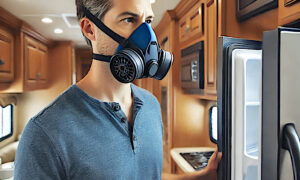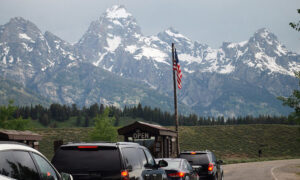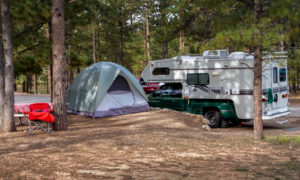
Last updated on June 14th, 2024 at 08:38 pm
Get a Thorough Walk-Through

Buying From a Dealership
If you are purchasing from an RV dealership, you should receive a walk-through of your RV. This walk-through is crucial for understanding your new RV’s systems and features. Your salesman or an RV tech will show you how everything works and where everything is and answer your questions.
Buying From a Private Party
If you considering the purchasing an RV from a private party, a walk-through doesn’t always happen. But if the sell is willing, take the time. Even if you do, it may not be as thorough as it should be. I recommend you hire an RV tech for a proper walk-through BEFORE you buy. While there is a cost involved, it could save you thousands of dollars.
Tips for a Successful RV Walk-Through
Take Video and Have a Camera Handy
Take video during the walk-through. This can be invaluable for reviewing how things work later on. Videos provide a visual reference that can clarify complex systems and procedures. Take photos and make a note of anything that is not working properly or shows damage. Major prondblems should be addressed before your trip. Minor repairs can wait until after your first trip if you don’t mind waiting. If you purchased new from a dealer, all these issues should be covered by a warranty.
Create a Checklist
During your walk-through, use this checklist of the items and systems you need to understand. You can the list below or download a printable PDF copy.
More Tips for a First-Time RVer
Familiarizing yourself with your RV is a crucial first step to ensuring a safe and enjoyable experience on the road. By understanding the ins and outs of your RV, you’ll be better equipped to handle any situation that arises and keep your home on wheels running smoothly. Here are some essential tips to help you get to know your RV thoroughly.
Getting to Know the RV
Document Everything
User Manuals: Collect all user manuals for the appliances and systems in your RV. Keep them in a designated place for easy reference. These manuals are invaluable for troubleshooting and regular maintenance.
Videos: If possible, record videos during the walk-through. These can be invaluable for reviewing how things work later on. Videos provide a visual reference that can clarify complex systems and procedures.
Learn the Basics of RV Maintenance
Knowing how to perform basic maintenance can save you time and money. During the walk-through, ask the RV tech to show you:
- Proper Tire Pressure: Learn the recommended tire pressure for your RV and how to check and maintain it. Proper tire pressure is crucial for safety and fuel efficiency.
- Battery Maintenance: Understand how to test and charge the RV battery. Regular battery maintenance ensures you have reliable power for your travels.
- Roof and Seal Inspection: Learn how to inspect and clean the roof and seals to prevent leaks. Regular checks can prevent costly water damage.
- Fuses and Light Bulbs: Know how to check and change fuses and light bulbs. Carry spare fuses and bulbs to avoid inconvenience on the road.
Understand Safety Features
Ensure you are familiar with the location and operation of all safety features in your RV, including:
- Fire Extinguishers: Know where they are located and how to use them. Regularly check that they are charged and accessible.
- Smoke and Carbon Monoxide Detectors: Test these regularly to ensure they are functioning properly. Replace batteries as needed and know what the alarms sound like.
- Emergency Exits: Identify and practice using emergency exits. Make sure all family members know how to use them in case of an emergency.
Trip Preparation
You’ve done the walk-through, made necessary repairs and the RV is ready to roll. What’s next?
Before you hit the open road find a large vacant parking lot or field and practice maneuvering and backing your RV. See this article for more info:
http://rvtipoftheday.com/general-tips/rv-tailswing-and-spatial-awareness
Make a list of the things you will need for your RV trip. Use the list to check off thing as you load them.
Essential Items for Your New RV
This RV checklist is a starting point for your motorhome, travel trailer, or fifth wheel. Customize it to suit your needs by adding or subtracting items.
| Kitchen Essentials | |
|---|---|
| (__) Spices | (__) Cooking oil |
| (__) Bottled water | (__) Hot chocolate mix |
| (__) Flour | (__) Coffee |
| (__) Sugar | (__) Boxed juices |
| (__) Syrup | (__) Pots & pans |
| (__) Utensils | (__) Silverware |
| (__) Tablecloth | (__) Kitchen towels |
| (__) Wash bins | (__) Scrubbing pads |
| (__) Pot holders | (__) Coffee pot |
| (__) Cutting board | (__) Kitchen rags |
| (__) Coffee filters | (__) Coffee cups |
| (__) Tablecloth holders | (__) Dish drainer |
| (__) Can opener | (__) Champagne glasses |
| (__) Knives | (__) Tea kettle |
| (__) Napkins | (__) Paper towels |
| (__) Trash bags | (__) Aluminum foil |
| (__) Dish detergent | (__) Matches |
| (__) Paper plates | |
| Sleeping & Comfort | Lighting & Safety |
| (__) Pillows | (__) Lantern |
| (__) Sleeping bags | (__) Flashlight |
| (__) Beach chairs | (__) Batteries |
| (__) Beach towels | (__) Stove lighter |
| (__) First aid kit | |
| Tools & Accessories | Personal Items |
| (__) Bungie cords | (__) Books |
| (__) Whisk broom | (__) Pair of old shoes |
| (__) Rope | (__) Coats |
| (__) Kleenex | (__) Backpacks |
| (__) Toilet paper | (__) Sun screen |
| (__) Ax | |
| (__) Firewood | |
| (__) Small ice chest | |
| Cooking & Dining | Entertainment & Extras |
| (__) Charcoal | (__) Radio |
| (__) Portable BBQ | (__) Games |
| Additional Essentials | |
| (__) RV-specific tools and repair kits | (__) Water hose and water pressure regulator |
| (__) Sewer hose and sewer fittings | (__) Leveling blocks |
| (__) Surge protector | (__) Fire extinguisher |
| (__) RV-friendly toilet paper | (__) Personal hygiene items |
| (__) Extra bedding and blankets | (__) Outdoor mat or rug |
Remember, this checklist is not exhaustive and should be tailored to your personal preferences and travel style. You will forget things but it’s okay. Most items can be purchased at the campground or at a store near the campground.
Make Your First RV Trip Close to Home
Plan your first RV trip to somewhere close to home. Some RV lifestyle ‘experts’ even advise your first campsite should be the driveway of your home. There’s good reasoning to that advice. First, anything you forgot is just a few steps away. Second if the air conditioner dies on the hottest day of summer or the heater quits during an especially cold night you can retreat to the house.
But lets be real here, you didn’t buy an RV so you could camp in your driveway. Right? So my advise is that you pick a campground or RV park just a few miles from home.
Remember, you’re going camping not taking a road trip. Why spend a large part of your weekend driving when you could be actually enjoying your new RV. Besides it is no fun arriving late, tired from the drive… maybe even after dark… and have to back in and unhitch and then make camp. Then, of course, you’ll have to leave the campground early and face the long drive home.
I highly recommend reserving a campsite that has water, electric and most importantly sewer hookups. It’s so tempting to head off to a campsite in the forest of right on the beach but these campsites most often do not have a sewer hookup. I’ll bet you a dozen doughnuts that you will fill your gray water tank before the weekend is over and without a sewer hookup to drain into you’ll be forced to hitch up and head for a dump station or even head home early.
Know the Length of Your Rig.
When making reservations, you will be asked what your length is, they usually want the length of the rig. Meaning the tow vehicle and trailer or mtorhome and towed combined. That’s a rig.
Many parks have limits on the length of RV they can fit. Many state parks can not handle longer RVs because the roads leading to the park as well as inside the campground are too winding or narrow. Check ahead before you go to avoid any unpleasant surprises.
Stay Close to Home
The primary reason for choosing a campsite close to home is to minimize stress. If you have never driven a large vehicle it can be stressful. keeping the drive time short will make the trip easier. Keep in mind that you will likely drive slower than you may normally drive a car so it is all the more reason to stay close to home.
If you’ve never backed a trailer or motorhome into a campsite you could get very frustrated very fast. Remember that you are new to this and once you have done it a few times you will get a routine down. Work out the hand signals ahead of time or get radios to talk to each other so that nothing is missed. For the person helping back up, always remember, if you can’t see the driver in the mirror or otherwise, they can’t see you! No point in doing hand signals if you can’t be seen. See the article for more details: http://rvbasics.com/techtips/rv-backing.html








not necessarly a first time but learned a few lessons from the first trip after you practice backing in and the other driving tips your gonna need you dont have to camp in your drive way but stay reasonably close this time were staying in an area we know for a year to learn the quips and querks of this one last time we set off in to the mountains with out a clue….lesson learned bring on the camping or at least the rest areas and truck stops in the area